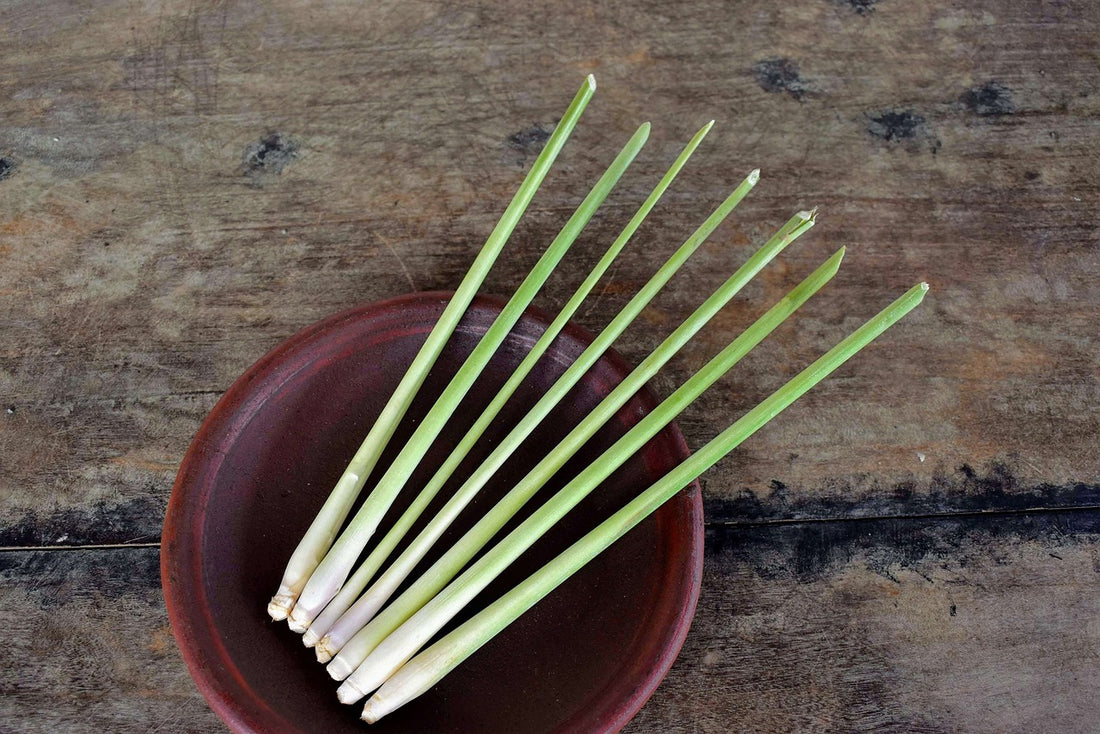
Lemongrass Essential Oil: Aromatherapy, Skin Care & Insect Repellent
Share
Introduction
Welcome to the vibrant world of lemongrass essential oil—a staple in aromatherapy and natural wellness communities worldwide. Known for its refreshing citrus scent, lemongrass oil is not only cherished for its delightful aroma but also for its versatile uses in everything from skincare to natural pest control. Whether you’re looking to enhance your home’s ambiance, craft your own skincare products, or find a natural way to ward off insects, lemongrass essential oil offers a natural solution that’s as pleasant as it is effective.
Join us as we delve into the benefits, uses, and all the must-know details about lemongrass essential oil. Let’s get started!
Explore our range of high-quality essential oils at Aroma Energy.
What is Lemongrass Essential Oil?
Lemongrass essential oil is extracted from the leaves and stalks of the lemongrass plant, a tropical herb that is a staple in cooking and traditional medicine across various cultures, particularly in Southeast Asia. The oil is renowned for its sharp, citrusy fragrance which comes from its high citral content, a natural compound that imparts a lemon-like scent.
Lemongrass essential oil is often confused with citronella oil, another popular oil in the realm of natural insect repellents. While both oils share some components and benefits, lemongrass oil is generally preferred for its sweeter, more robust aroma and its ability to blend well with other fragrances in aromatherapy practices. It’s a favorite in the creation of scented products such as candles, soaps, and perfumes, adding a fresh and energizing note.
Whether you’re looking to purchase in small quantities for personal use or interested in bulk lemongrass oil for business needs, understanding the unique characteristics of lemongrass essential oil can help you make the most of its aromatic and therapeutic properties.

The Benefits of Lemongrass Essential Oil
Lemongrass essential oil is cherished not only for its invigorating scent but also for its multitude of benefits that make it a staple in any natural wellness collection. Here are some key benefits of incorporating lemongrass essential oil into your daily life:
- Aromatherapy: Lemongrass essential oil is widely used to uplift the mood and reduce stress, anxiety, and depression through aromatherapy. Its ability to promote a sense of well-being makes it ideal for enhancing your living or working environment.
- Skin Care: When mixed with a carrier oil, lemongrass essential oil can be applied topically to help cleanse and balance oily skin, tighten pores, and strengthen skin tissues. Its natural astringent properties make it an excellent choice for facial toners and cleansers.
- Natural Antimicrobial: Thanks to its antibacterial and antifungal properties, lemongrass oil is a valuable component in homemade cleaning products. It not only helps disinfect and clean surfaces but also leaves behind a refreshing, clean scent.
- Pain Relief: Lemongrass essential oil is known for its anti-inflammatory properties, making it effective in easing pain and discomfort from headaches, joint pains, and muscle strains.
Safe and Effective Usage
While lemongrass essential oil offers numerous external benefits, it is important to note that it should not be ingested. Always ensure it is properly diluted with a carrier oil before topical application to avoid skin irritation.
Explore the delightful aroma and therapeutic properties of our lemongrass essential oil. Whether diffused, applied topically, or used as part of your cleaning routine, lemongrass oil is an exceptional addition to any home.
How to Use Lemongrass Oil
Lemongrass essential oil is incredibly versatile, offering a variety of uses that can enhance your lifestyle while ensuring safety and efficacy. Here are some popular ways to utilize this aromatic oil:
In Aromatherapy
- Diffusing Lemongrass: Add a few drops of lemongrass essential oil to your diffuser to fill your space with its uplifting and refreshing aroma. This is ideal for enhancing focus, reducing stress, and creating a welcoming environment in your home or office.
- Personal Inhalers: For a quick mood boost on the go, add lemongrass oil to a personal inhaler stick. This method allows you to enjoy the benefits of lemongrass whenever you need a moment of clarity or a breath of fresh air.
As a Natural Insect Repellent
- DIY Insect Repellent Sprays: Combine lemongrass essential oil with water and other essential oils like eucalyptus or citronella to create a natural insect repellent spray. This blend can help keep mosquitoes, flies, and other pests at bay.
- Lemongrass Oil Candles: Make or purchase candles infused with lemongrass essential oil for a natural way to repel insects while adding a serene ambiance to your outdoor spaces.
For Skin Care
- Lemongrass Toner: Blend lemongrass essential oil with witch hazel for a refreshing facial toner that can help tighten pores and control oil production. Always ensure to dilute the essential oil adequately to prevent skin irritation.
- Massage Oils: Add a few drops of lemongrass oil to a carrier oil such as coconut or almond oil for a soothing, aromatic massage oil that not only smells great but also helps in relieving muscle and joint pain.
In Homemade Cleaning Products
- Surface Cleaners: Add lemongrass oil to your homemade cleaning solutions to utilize its antimicrobial properties and leave behind a fresh, clean scent.
- Laundry Freshener: A few drops of lemongrass oil in your laundry can impart a fresh, clean smell to your clothes, especially during the damp seasons.
Each of these uses showcases the adaptability and benefits of lemongrass essential oil, making it a valuable addition to your natural product collection. Be sure to explore our lemongrass essential oils to start incorporating these ideas into your routine.
Safety and Precautions
While lemongrass essential oil offers numerous benefits, it's important to use it safely and responsibly to ensure the best outcomes and avoid potential risks. Here are key safety tips and precautions to consider when using lemongrass essential oil:
Topical Use
- Dilution: Always dilute lemongrass essential oil with a carrier oil (such as jojoba, coconut, or almond oil) before applying it to the skin. The recommended dilution is typically about 1% to 2%, which equates to about 1 to 2 drops of essential oil per teaspoon of carrier oil.
- Patch Test: Before using lemongrass oil extensively, perform a patch test. Apply a small amount of the diluted oil to a patch of skin on your forearm to check for any adverse reactions like redness or irritation.
Aromatic Use
- Environmental Considerations: When diffusing lemongrass oil, ensure the room is well-ventilated. Some people may experience respiratory irritation from essential oils, especially in enclosed spaces.
- Sensitivity: Be cautious if you have a history of allergies or respiratory issues. Discontinue use if you notice any signs of respiratory discomfort or other allergic reactions.
Special Precautions
- Pregnancy and Nursing: Pregnant and nursing mothers should consult healthcare professionals before using lemongrass essential oil, as it can influence hormonal balances and muscle tone.
- Pets: Use caution when diffusing lemongrass oil around pets, especially cats and dogs, as they can be more sensitive to essential oils than humans. It is advisable to consult with a veterinarian before using it around your pets.
- Children: Avoid using lemongrass essential oil on or around young children without medical advice, as their skin and respiratory systems are more delicate.
Recognizing Quality
- Quality and Purity: To ensure safety and efficacy, only use high-quality, pure lemongrass essential oil from reputable sources. Inferior quality oils may not provide the desired benefits and could potentially cause harm.
Following these guidelines will help maximize the benefits of lemongrass essential oil while minimizing risks. By respecting its potent nature and adhering to proper usage practices, you can safely incorporate this wonderful oil into your daily routine. Discover more about our lemongrass essential oil and begin experiencing its many benefits today.
FAQs About Lemongrass Essential Oil
Lemongrass essential oil is a popular choice for many due to its versatile uses and benefits. Here, we address some of the most commonly asked questions to help you better understand and utilize this powerful oil:
Can you put lemongrass oil on your skin?
Yes, lemongrass oil can be applied to the skin, but it should always be diluted with a carrier oil first to prevent irritation. A patch test is recommended to ensure there is no adverse reaction before widespread use.
Is lemongrass oil a mosquito repellent?
Absolutely! Lemongrass oil is an effective natural mosquito repellent. Its high citral content is unappealing to mosquitoes, making it a safe alternative to chemical repellents. Use it in sprays or diffusers to keep these pests away.
What bugs hate lemongrass oil?
In addition to mosquitoes, lemongrass oil is known to repel a variety of pests including ticks, fleas, and no-see-ums. Its strong scent is a natural deterrent for many insects.
Does lemongrass repel spiders?
Yes, lemongrass oil can also be effective in repelling spiders. Its strong aroma is believed to be undesirable to spiders, helping to keep them at bay without the use of harsh chemicals.
How do you use lemongrass as an insect repellent?
To use lemongrass oil as an insect repellent, mix a few drops with water and other essential oils in a spray bottle and apply it to your skin, clothing, or around your living areas. This natural repellent is not only effective but also leaves a pleasant scent.
Which is better: lemongrass or citronella?
Both lemongrass and citronella are effective at repelling insects, but they have different scents and properties. Lemongrass has a sweeter, more robust aroma and can be used in a wider range of applications beyond just insect repellency, such as in skincare and aromatherapy.
Is lemongrass safe for dogs and cats?
While lemongrass oil is generally safe for dogs in small amounts, it should be used with caution around cats as they are particularly sensitive to essential oils. Always consult with a veterinarian before using lemongrass oil around pets.
By addressing these FAQs, we aim to provide you with comprehensive knowledge about lemongrass essential oil so you can make the most of its many benefits. Explore further and enrich your natural wellness practices with our lemongrass essential oil.
Conclusion
As we've explored the various facets of lemongrass essential oil, it's clear why this natural wonder is a favorite among those seeking holistic health and wellness solutions. From its refreshing aroma that uplifts the spirit to its practical applications in skincare, pain relief, and as a natural insect repellent, lemongrass essential oil offers a myriad of benefits that can enhance your quality of life.
Whether you're looking to create a soothing environment in your home, incorporate natural ingredients into your skincare routine, or find an effective, chemical-free way to keep pests at bay, lemongrass essential oil is an excellent choice. Remember to always use it safely, respecting its potency and adhering to proper dilution guidelines to ensure the best results.
We invite you to discover the full potential of lemongrass essential oil in your daily routines. For high-quality, pure lemongrass essential oil, visit our product page at Aroma Energy Lemongrass Essential Oil and start experiencing the natural benefits today. Embrace the natural solution that lemongrass essential oil provides and enjoy the positive changes it brings to your life and well-being.

